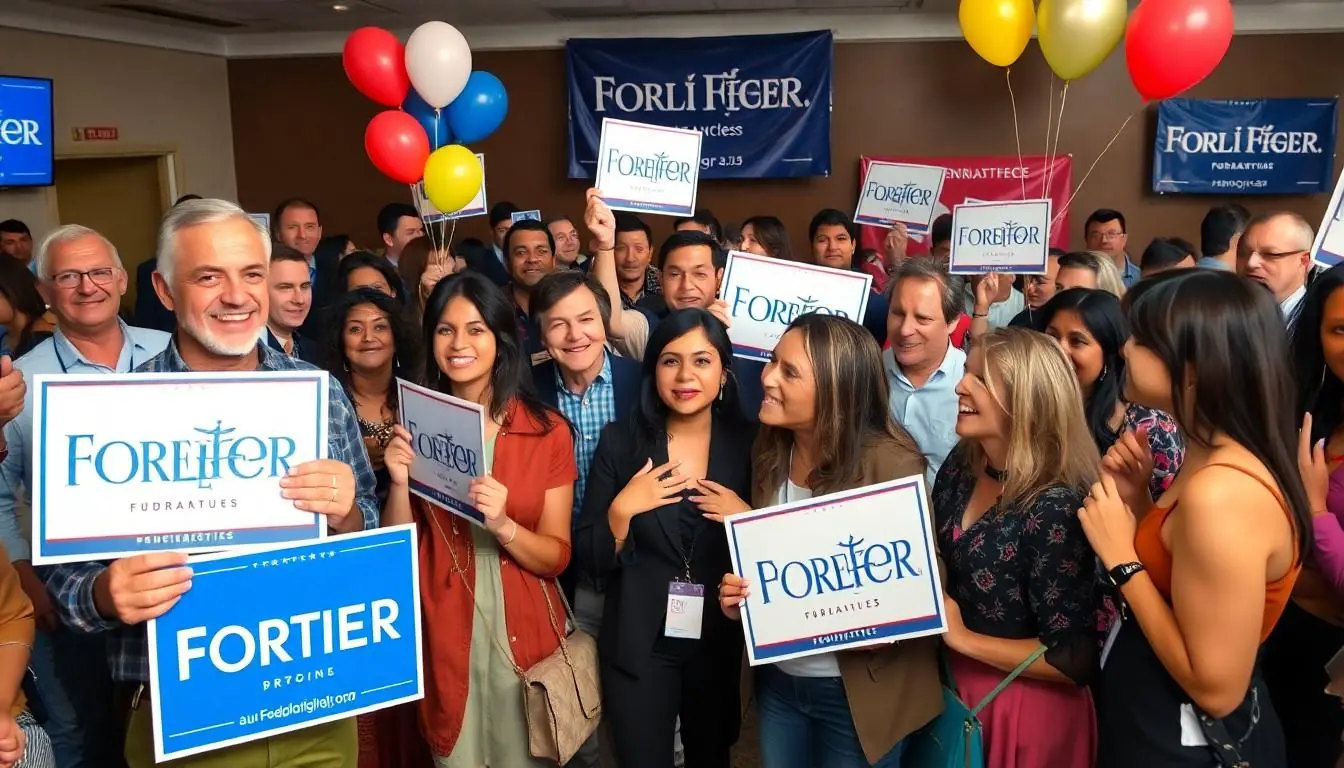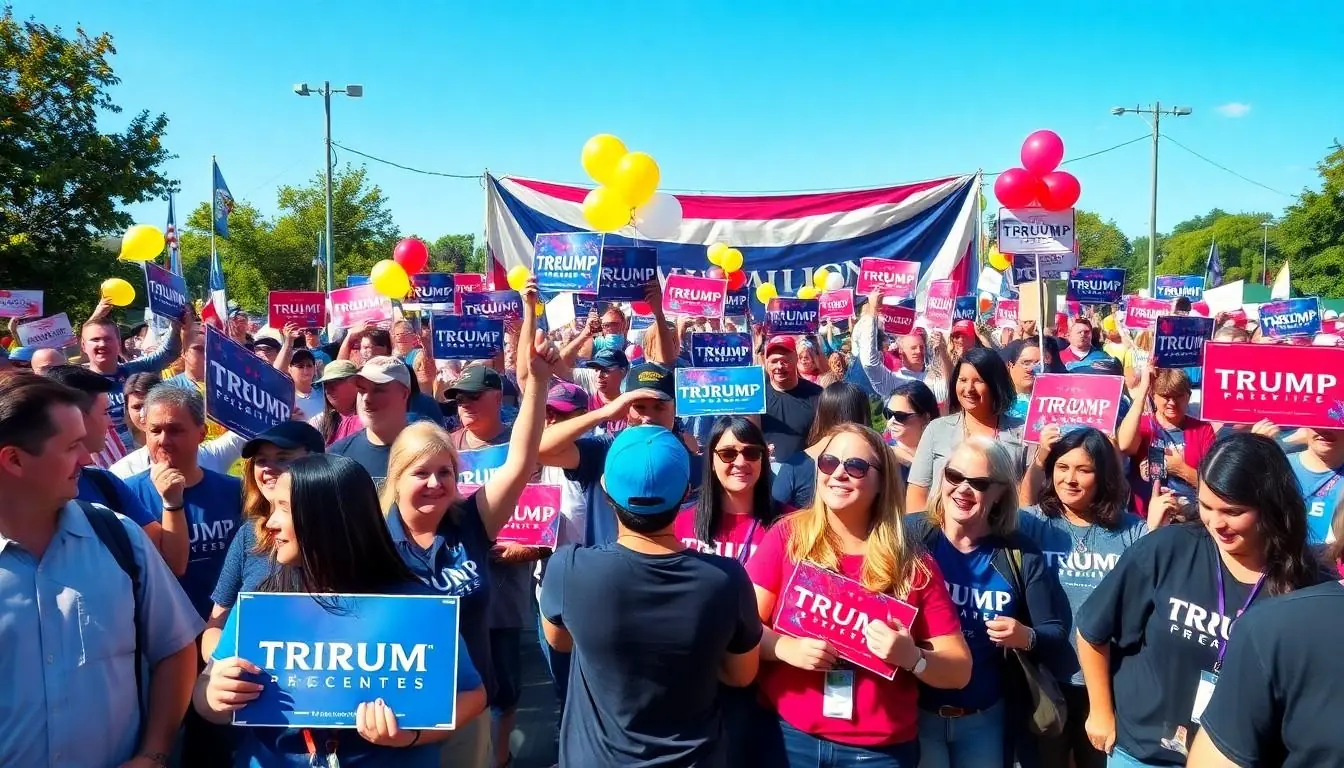Table of Contents
ToggleIn the high-stakes game of politics, fundraising is the secret sauce that can make or break a campaign. While candidates charm voters with their dazzling speeches and promises, it’s the money behind the curtain that fuels their ambitions. Think of it as the oil that keeps the political machine running smoothly—without it, even the most charismatic candidate might find themselves stuck in neutral.
Overview of Fundraising Political Campaigns
Fundraising serves as a backbone for political campaigns. Candidates require financial resources to support various components like advertising, organizational infrastructure, and outreach efforts. Campaigns often employ multiple strategies to secure donations, including hosting events, utilizing online platforms, and directly reaching out to potential contributors.
Financial support comes from various sources. Individuals, political action committees, and corporations all play a significant role in providing funding. Different contribution limits apply across these sources, affecting how candidates approach fundraising. For example, individuals often have lower contribution limits than corporations, influencing the fundraising strategies.
Effective campaigns set clear fundraising goals. Candidates typically assess their needs based on budget estimates and campaign timelines. By establishing these goals, campaigns can better engage supporters and mobilize resources. Regular updates on fundraising progress can also motivate donors to assist further.
Strategic messaging remains crucial in attracting donations. Campaigns often highlight key issues or personal stories to resonate with potential donors. This narrative approach helps establish a connection, making individuals more likely to contribute.
Compliance with legal regulations demands attention. The Federal Election Commission oversees fundraising activities, requiring transparency in reporting contributions. Adhering to these rules ensures that campaigns maintain credibility and public trust.
Rapid advances in technology reshape fundraising tactics. Online fundraising platforms streamline donor engagement and streamline the support process. Social media also plays a pivotal role, allowing campaigns to reach broader audiences quickly.
Fundraising’s importance in political campaigns cannot be overstated. Without adequate financial backing, even the most compelling candidates face significant challenges in bringing their messages to the public.
Importance of Fundraising in Politics


Fundraising plays a pivotal role in the effectiveness of political campaigns. Financial resources drive operations, outreach, and visibility.
Impact on Campaign Success
Campaign success often hinges on adequate funding. With substantial resources, candidates can invest in advertising, staff, and infrastructure. Campaigns lacking financial support face significant obstacles. They struggle to reach potential voters, limiting their influence. Statistics show that candidates with robust fundraising efforts tend to perform better in elections. For example, candidates who raise over $1 million often secure competitive advantages in key races. Engaging donors boosts visibility and creates a sense of legitimacy around the campaign. Without strong fundraising, even the most charismatic candidates find it challenging to compete effectively.
Role in Voter Engagement
Fundraising directly influences voter engagement strategies. Financial backing allows campaigns to organize events, rallies, and outreach efforts that mobilize supporters. Several types of engagements benefit from enhanced funding, like town halls and community forums. Campaigns can allocate budget for technology and communication tools that enhance voter interaction. Successful fundraising initiatives help campaigns create narratives that resonate with the electorate. Engaging storytelling supported by adequate funding captures voters’ attention and builds lasting connections. When campaigns demonstrate financial sustainability, they often gain greater trust from voters, further solidifying their support.
Types of Fundraising Methods
Fundraising methods vary widely, encompassing traditional techniques and emerging digital strategies to meet campaign needs effectively.
Traditional Fundraising Techniques
Candidates often rely on traditional fundraising techniques to support their campaigns. Events like dinners and rallies engage supporters while fostering connections. Personal outreach remains vital, with candidates or volunteers directly requesting contributions from individuals. Mailings and phone calls still achieve results, targeting vetted donor lists to ensure maximum impact. Direct solicitation from wealthy donors and political action committees provides significant funding opportunities. Utilizing these methods creates a sense of community, allowing supporters to feel directly involved in the campaign’s success.
Digital Fundraising Strategies
Digital fundraising strategies have transformed political campaign financing. Online donation platforms facilitate quick and easy contributions from supporters across different demographics. Social media campaigns enhance direct engagement, allowing candidates to share messages and solicit donations effectively. Email outreach plays a crucial role, with personalized messages to past donors often re-engaging them. Crowdfunding has also gained traction, empowering grassroots supporters to contribute to specific campaign initiatives. Analytics tools enable campaigns to track performance and adjust strategies in real-time, optimizing fundraising efforts.
Legal Regulations and Compliance
Legal regulations play a significant role in the fundraising landscape for political campaigns. Compliance with these rules ensures campaigns operate within the framework set by the government.
Key Laws Affecting Fundraising
Key laws that influence political fundraising include the Federal Election Campaign Act, which establishes contribution limits and reporting requirements. The Bipartisan Campaign Reform Act further restricts certain types of donations and imposes regulations on advertising. States may also have specific laws that govern fundraising practices, impacting how campaigns operate on a local level. Understanding these legal stipulations is crucial for candidates seeking to maximize their fundraising potential while remaining compliant. Additionally, the penalties for noncompliance can significantly hinder campaign efforts and public trust.
Importance of Transparency
Transparency in fundraising is essential for maintaining credibility in political campaigns. The Federal Election Commission mandates that campaigns disclose their financial activities, detailing contributions and expenditures. This transparency builds trust with voters, who are more likely to support campaigns that show accountability. Moreover, clear reporting also discourages unethical practices and potential corruption. As campaigns adopt digital fundraising methods, ensuring transparency in online platforms is vital for effective communication with donors. Ultimately, a commitment to transparency not only fosters a positive image but also strengthens the overall political process.
Challenges in Fundraising Political Campaigns
Fundraising in political campaigns presents various challenges that candidates must navigate to achieve success. Understanding these obstacles is key to developing effective strategies.
Competition for Funds
Competition for funds remains fierce in political campaigns. Candidates vie for attention among a limited pool of wealthy donors, making it essential to differentiate themselves. Campaigns often struggle when previous leaders set high fundraising benchmarks, creating pressure to meet or exceed them. Additionally, multiple candidates in a race can dilute potential donations, prompting campaigns to adopt innovative and impactful messaging to attract funds. Effective outreach also relies on establishing relationships with potential donors, ensuring ongoing contributions to support campaign goals.
Addressing Donor Influence
Addressing donor influence poses a significant challenge for campaigns. Large donations can lead to perceptions of bias or favoritism, which may alienate voters. Candidates must balance acceptance of contributions while maintaining their commitment to transparency and integrity. Clear communication about funding sources helps mitigate concerns about undue influence. Implementing strict policies on accepting donations from specific sectors can also strengthen public trust. Ultimately, fostering a culture of ethical fundraising and transparency remains crucial for candidates, aiding in building strong connections with the electorate.
Fundraising remains a cornerstone of political campaigns, directly influencing their success and outreach. Candidates must navigate the complexities of financial support while adhering to legal regulations to maintain public trust. As they engage with donors through both traditional and digital methods, transparency and ethical practices become paramount. The ability to connect with supporters not only boosts financial resources but also fosters a sense of legitimacy and credibility. Ultimately, effective fundraising strategies empower candidates to amplify their messages and mobilize voter engagement, making financial backing an indispensable element in the competitive landscape of politics.




